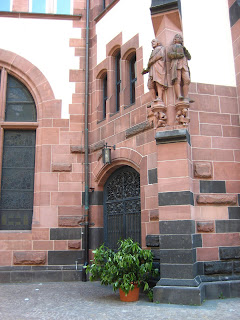 I went to Cologne by train, but this time I had learnt the lesson and I had no difficulty in getting an unreserved seat for my trip. Cologne lies 200 kilometres north of Frankfurt and it only took an hour, so imagine the average speed of the train. It is really recommended from my side going there at least once when living in Frankfurt.
I went to Cologne by train, but this time I had learnt the lesson and I had no difficulty in getting an unreserved seat for my trip. Cologne lies 200 kilometres north of Frankfurt and it only took an hour, so imagine the average speed of the train. It is really recommended from my side going there at least once when living in Frankfurt.I started my visit by going to the ruins of a Roman turm and to the ElDeHaus, former headquarters of Gestapo in Cologne. It is amazing how a country could fall into that kind of bloody crazyness in less than ten years. The cells of the prison, with the inscriptions in the wall by the real inmates is really breathtaking. Luckily, in my opinion, with initiative like this one, the horror of those days will not be forgotten and repeated.

Afterwards, I devoted my time to less material issues. Firstly, I went to the original house where the Eau de Cologne was created and I bought a bottle of it for my mother. The smell of the shop was quite nice, to tell you the truth. Then it was time for another important visit: Museum of Chocolate, the place where I would like to work. It is a nice museum, but obviously not like Prado or Louvre. Anyway it managed to keep me busy (and drooling) for an hour.
Then, the rest of the day was devoted to the cathedral. To get there I just walked close to the River Rhein, an incredibly wide river (I counted 442 steps over the Hohenzollern bridge, what would mean approximately the river being 330 metres wide). The area around the cathedral and the river is really pleasant.
The size of the cathedral itself is outstanding and the amount of statues and sculptures in it is beyond my vocabulary. Inside, there is a strange feeling, thanks to the light entering through marvellous windows and the height of the ceiling; one feels to be separated from the rest of the world in its interior, believe me, it is mainly a provider of peace. Unfortunately, I could not visit, since it was closed to visitors, the chapel where the Three Wise Men are supposed to be buried. I had some complaints for them, grrrr!
 I also climbed the 509 steps of one of the towers to have impressive views of Cologne. It was midday, very hot and I think the Pope Benedictus XVI should grant heaven to anyone doing this, because it was kind of hard and sweatful experience. Due to this bias, probably, I do not classify Cologne's cathedral as the most impressive one I have ever been to. This first place belongs to Strasbourg's cathedral, but together with Vienna's, Cologne's could easily get a place in the podium.
I also climbed the 509 steps of one of the towers to have impressive views of Cologne. It was midday, very hot and I think the Pope Benedictus XVI should grant heaven to anyone doing this, because it was kind of hard and sweatful experience. Due to this bias, probably, I do not classify Cologne's cathedral as the most impressive one I have ever been to. This first place belongs to Strasbourg's cathedral, but together with Vienna's, Cologne's could easily get a place in the podium.




